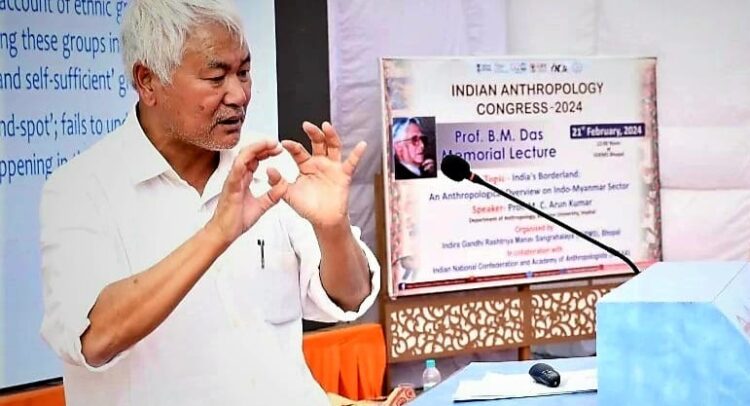
Asem Bhakta Singh , Special Correspomdent
North East
Imphal :The Indian National Confederation and Academy of Anthropologists (INCA) recently hosted the Professor BM Das Memorial at the Indira Gandhi Rashtriya Manav Sangrahalaya in Bhopal. This event, an integral part of the three-day national conference of the Indian Anthropologist Congress, was chaired by Professor KK Basa, who paid tribute to the late Dr. Bhuban Mohan Das for his significant contributions to understanding human diversity within physical anthropology.
During the memorial, Professor MC Arun of Manipur University delivered a poignant discourse on the anthropological dynamics of India’s borderlands. Prof. Kumar underscored the profound impact of neighbouring behaviours on a nation’s geopolitical stance, emphasising India’s extensive land borders with Myanmar, Bhutan, Nepal, China, Pakistan, and Bangladesh. He highlighted the intricate interplay between socio-cultural ties and geopolitical considerations in these regions. Prof. Arun’s address focused on the India-Myanmar border, stretching from Arunachal Pradesh to Mizoram, as a compelling case study in cross-border dynamics. With four Indian states sharing international borders with Myanmar and 19 Indian districts adjacent to the neighbouring country, the region serves as a hub of diverse tribal communities engaged in various activities. Prof. Kumar emphasised their profound interdependence, underpinned by strong social, cultural, and kinship ties, which present challenges for the border management efforts of both nations.
The discourse shed light on the need for nuanced and culturally sensitive approaches to border management. Prof. MC Arun stressed the importance of understanding and addressing these socio-cultural dynamics to foster mutual understanding and cooperation between India and Myanmar.
Earlier, while giving a brief introduction of Professor Bhuban Mohan Das , Professor KK Basa provided insights into Dr. Bhuban Mohan Das’s remarkable work in understanding human diversity, particularly in North East India and Assam, through physical anthropology. Dr. Das’s contributions to various literary and cultural associations were highlighted, showcasing his notable selection of ethnic groups for studying human diversities.
Following the memorial, a Round Table Conference was convened to discuss the preservation of tangible and intangible cultural heritage in India, utilising anthropological methodologies. This comprehensive discourse addressed the multidimensional challenges and opportunities inherent in managing India’s borders through an anthropological lens.
The insights shared during these sessions are expected to guide future policies and initiatives aimed at fostering harmonious relations and effective border management between India and Myanmar.


